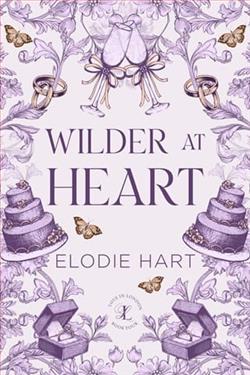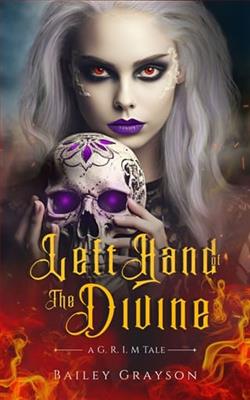Page 51 of Kiwi Gold
But he’d just warned meoff.
I decided to say, “Not sure I’ve got that good a story, sorry.”
“I told you, I’m special. But tell me anyway. Let me be the judge.”
I should offer something funny, too, but I couldn’t, because only one image had come to mind when he’d asked. “It would be the stories she told me, then. The songs she sang me, when she put me to bed. She’d lie on the bed beside me, curled up with her head on her hand, and tell me stories of her childhood, about the sweets the cook made and how Mama would sneak down to the kitchen for more. About her father’s doves in their dovecote on the roof of their big white villa, and how they could find their way home from anywhere. How they’d come to her when she went to visit them, and how softly they’d coo. And my favorites, the ones where she fell in love with my father, and married him. I tell those same stories to my girls now. My mum … she was like Scheherazade with her stories, except that she didn’t tell them to appease my father. My father was what you said. He’d won the prize, and he knew it.”
“I just thought about Scheherazade,” he said. “Earlier tonight.”
“You’re joking. Why?”
“Something about your eyes,” he said. “If your mum had those eyes, I can believe she bewitched him.”
“Hers were much darker,” I said, trying not to let that melt me. “She was very beautiful, and her parents had such plans for her. And then she met my dad. Of course, now I realize that her lessons about being a good, obedient daughter and a good Muslim may haveslightlycontradicted the stories about how she met my dad in secret, how her parents refused permission, and how she was determined to marry the infidel anyway. If you’re going to make a legend of your family story, you have to expect that your daughter, who does her lessons like you’ve always told her to and can manage a bit of logic, will spot the inconsistencies.”
“Ah,” Lachlan said. “It’s an adventure story. Tell me.”
So I did, because what a tale it was.
23
SCHEHERAZADE
Lachlan
She took another drink of my wine, and the waiter took the vegies away and brought something else. Something molded, with fruit. Nothing I was too interested in, and apparently, neither was Laila, because she ignored it, handed me back the wine, looked across at me, her eyes gleaming gold, the red in her hair picked up by the candlelight, and said, that husky, sweet voice wrapping around me like a blanket, “It was a tale from the Arabian Nights. My father, a Viking from an old story, with his red beard and hair, his size and his strength, and my mother so clever, so graceful, tiny and beautiful and shining like the moon. There are pictures, and she’s just … she’s perfect. A beautiful newborn. A beautiful nine-year-old. Beautiful until the day she died. She was like …” She paused, her eyes far away. “Like a miniature portrait, framed in gold. A precious pearl to her own father and mother, whose only daughter and youngest child she was. They’d sent her to university, and she’d just graduated as a trained architect. She’d been allowed to put off marriage, too, and was still single at twenty-two. Meanwhile, her parents had compiled a list of suitable bridegrooms and made their plans.”
“Ah,” I said. “Pretty clear where this is going.”
“Yes. Their only question was—which of the scions of Kuwait’s wealthy merchant class was good enough for her? The heir to his father’s import business? The up-and-coming junior minister at the oil ministry? Or should they aim higher? Even at … drumroll, please … the royal family? Which always made her laugh.”
“Not Torsten Drake,” I said.
“Not even close,” Laila said. “At this point in the story, she would tell me, ‘But how could I look at anyone else, or think of anyone else, once I saw your father? It was the thunder, and then it was the lightning. It was weeks of catching my breath every time I saw him, and the way he looked at me, too, as if he felt the same. Of seeing him at night, when I closed my eyes, and wondering if he was seeing me, too, if my heart could truly be tied to his on invisible threads, or if that only happened in romantic stories. Of being afraid, because I’d never had these feelings before. I was the sensible one among my friends, the unromantic one, the one focused on her career. And yet here those feelings were anyway, blossoming overnight and overpowering me. Three times, then, when he actually talked to me, just a word or two, and the fourth time, when he dropped the note, covered it with his shoe, looked down at it, and moved away. The way I held my breath when I bent to pick it up, not sure if anybody had seen and not able to care. And after that, twice when we met alone, in an out-of-the-way passage in the basement, near the service lifts. Terrified that somebody would come around the corner and see us, not even able to touch his hand and wanting to so much, and to have him touch me. The second time we met like that, he asked me to marry him. He said, “I know I’m only twenty-five myself, and I don’t have much yet, but everything I have, I’ll share with you. I’ll live to make your life better. You have my word.” And there I was. I could stay safely at home, tell myself this was mad, and it would pass, and I didn’t really know him at all, even though it felt like I always had. I could wait to be married off to the man my parents chose, a man I might or might not learn to love, or I could throw everything away and follow Torsten into the storm. How could I not choose the storm?’”
“Crikey.” It was all I could think to say. “They mettwice?”
“Yes. Mum told me, ‘When it’s that right, you know. You want to be with him, to stay with him. His arms feel like home to you.’ I don’t know about that, but I do know it was true for her. For them. So there they were, and there were my grandparents. My mum was twenty-two, remember, and still not married, after all their patience. She told me, ‘My father’s anger, my mother’s sorrow, were terrible to behold.’ Their beloved child, the princess of their house, telling them that she’d fallen in love with an infidel, a man she would never have met but for the relaxing of the customs and rules that had her working for the Oil Ministry. Even going to job sites, which they’d trusted her to do, in their folly. Now, because of a foreigner she’d seen a handful of times, the last two in shameful secrecy, she wanted to leave them? For this? A man without money, without religion, without family, wanting to take her away from her family, from her community, from her country and her customs, to the bottom of the world?”
“That’s dramatic,” I said. “Torsten Drake, though. Force of nature. Sounds to me like your mum was a match.”
“Especially dramatic,” Laila said, “because she’d basically translate the story from Arabic as she told me, and Arabic is the most poetic language in the world. The reason for the rhetorical flourishes. My dad’s an exciting person, but my mum was, too. Quiet and reserved on the outside, and full of passion and intelligence and a kind of fierce loyalty inside, like she had candles burning in there. I think that’s why she loved my dad so much. He didn’t just see her beauty. He saw inside to the person she was, and he loved what he saw.”
“Go on, then,” I said. “What happened next?” As if she wereScheherazade herself, telling the story with so much intensity and power.
“Her parents reasoned,” Laila said, “and then they raged, and she was unmoved. Unmovable. Repeating that she wouldn’t have known her husband before the marriage anyway, no matter who he was, but shedidknow this man. She knew his heart and he knew hers, and she would never want anyone but him.”
“And they said it was romantic nonsense,” I guessed. Somehow, the hairs on my arms were standing up, though. It was the way she told it. The urgency, and the belief. That it had all happened exactly this way.
“Childish,” she said. “Ridiculous. Forbidden. You can’t marry a non-Muslim in Kuwait, even if the woman’s father allows it, because no woman can marry without her father’s permission. The patriarchy, eh. Literally. As for their marriage? It was out of the question.”
“But,” I said.
“But she refused to eat for twelve days and twelve nights, until the bones of her wrists were like a bird’s and she could barely stand. She told her parents she was willing to die for this, because there was no living without him, and they despaired. My father appeared at the door of the house in the morning and in the evening for twelve days running, and was turned away each time. And then, on the thirteenth day, because they had no choice, they let him in. His conversion to Islam before my grandfather, with the saying of theShahada,his promise to lead a Muslim life, and my grandfather’s permission, drawn from him as if it were his life’s blood. The fierceness of my grandfather’s face, his high-bridged nose and dark eyes like an eagle’s as he vowed vengeance on my father if he mistreated my mother, if he made her sorry for her sacrifice of her home and her family and her place in the world. And my father placing his hand on his heart and saying, ‘I will protect her, her body and soul and hopes and dreams, with my life, and I will cherish her until the day I die.’ Though he probably didn’t say it quite like that. It was my dad, eh, not some prince. Pretty sure whatever he said was much less poetic, but that was the gist. The stuff of the seventeenth century, not the twenty-first. It’s some pressure, being the only child born of a great love.”
“Did you believe it?” I asked. “The story?” She was right. It was the exact opposite from low-drama, down-to-earth New Zealand, but I’d worked in enough countries now to know that they weren’t all the same. And, maybe, that people needed legends. Something to believe in.
“Oh, yes,” she said. “I believed it. For them. But you cannotimaginehow many ideas my mother had about how I should go about finding that kind of love for myself. Mostly, they involved my being modest and graceful and reserved. And excellent at my lessons, of course. You see how well allthat’sworked. Also—graceful?”















